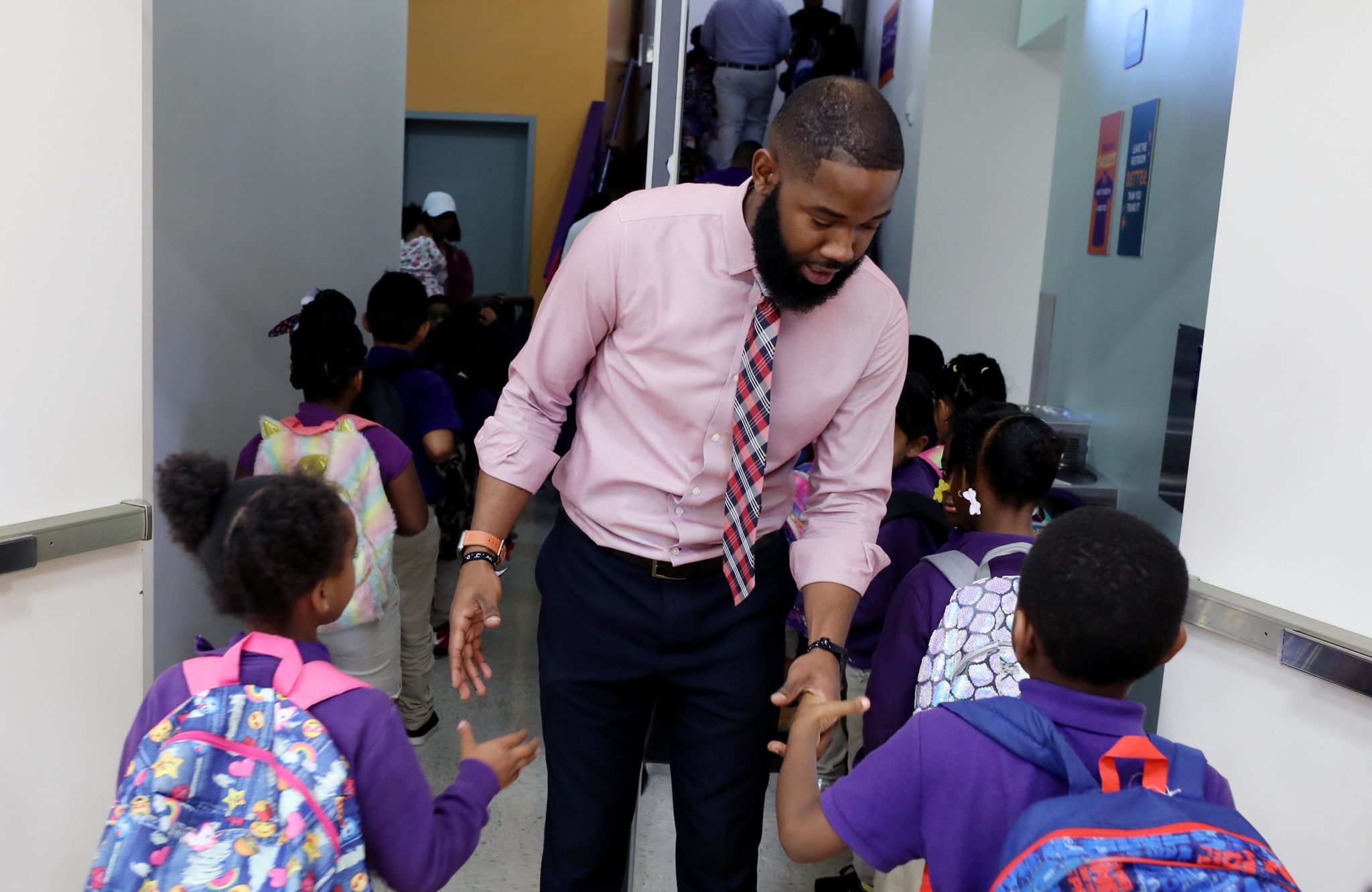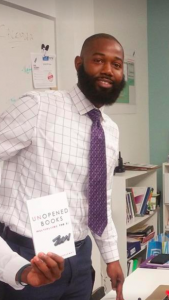
Unopened Books: Multiplying the 2%
by Jermaine Gassaway, Principal, Rocketship Nashville Northeast Elementary
Our children deserve to have teachers and mentors who embody Black excellence and serve as role models. Rocketship Nashville Northeast Academy’s Principal Jermaine Gassaway writes about the importance of having Black male educators in our classrooms in his book Unopened Books: Multiplying the 2%. The following is an excerpt from that book:

Principal Jermaine Gassaway of Rocketship Nashville Northeast Elementary
One cold winter day in Detroit, Michigan, I shook the hands of two Black male students. At face value, nothing seemed peculiar about this gesture; I was a teacher, and it was the way that I greeted every student, every day, who walked through my classroom door. However, this particular interaction led me down a path that I normally do not travel. It made me consider whether that these two students were on two distinct trajectories.
At about 2pm that school day, I was walking through the hallways of Detroit Edison Public School Academy, a K-12 network of public charter schools in Detroit, MI, to meet a kindergarten teacher whom I will call Ms. Brown. She stopped to ask me to take a Black male student to the office who had been misbehaving in class . . . From the moment I looked [the student] in the eye, shook his hand, and said to him, “come with me”, this five-year-old kid’s demeanor shifted. In fact, he immediately wanted to complete his schoolwork, and followed very directive given. It was clear once I was with the student that his behavior was not the primary issue. Of course, I gave him the typical “education is important”, and “misbehaving in class will not be tolerated” speech. I talked to him about his behavior and the consequences associated with it. I elaborated about the importance of getting a quality education no matter who was in front of him, or who he liked or disliked. After a while, I took him back to class instead of taking him to the office. However, later that day, he got into a fight with another student and was immediately suspended from school.
As I pondered my actions and the actions of the kindergarten student; I asked myself: was he really on a downward trajectory or was he desperately longing for care, guidance, and support from an authoritative figure that he could relate to – maybe a Black male? Now, I am not suggesting that Black men have all the answers to resolve our education crisis here in America, but I know from firsthand experience that having a Black male teacher in the classroom gives added benefit to students, particularly if they are African American – and more specifically, African American boys.
At the very same school, I shook the hand of a twelfth-grade student who had recently received several offers from prestigious colleges and universities around the country. I paused and thought to myself, “what is so different about this student that placed him on a path toward college?” Was it his determination? Was it his focus? Was it the fact that he came from a “better” background than the kindergarten student? No. No. And no! I later learned that a key difference in these two students was that the twelfth grader had a mentor in his life at an early age, who just so happened to be a Black male. Unaware of its significance, the twelfth grader spoke to me about the transformative opportunity to see someone who looked like him dream, set goals, achieve them, and pour into others. His mentor represented the man he sought to become. His body language captured the student’s attention and his voice awakened his drive to succeed. An education became something he wanted and that he knew he could achieve.
Here you have two students attending the same K-12 school but at opposite ends of the spectrum. One may experience potentially avoidable hardships, while the other is on a path to master the stages of life – all because one Black male took the time to pour into one Black boy.
The sad reality is that by the time students are in the third grade, prisons are being built on the basis of how many fail standardized tests or get wrapped up in America’s juvenile justice system. For far too many students of color, the gateway to incarceration begins with a referral from the classroom to the courtroom. This phenomenon is referred to as the “school-to-prison pipeline.” The NAACP Legal Defense Fund describes this pipeline as a “funneling of students out of school and into the streets and the juvenile correctional system.” How can the future of a seven-year-old be based solely on a test score? And how can we change his trajectory? These are the questions that many educators, including myself, continue to grapple with. This is where my work begins….
At the tender age of twelve, I realized I was missing something: a positive Black male presence. I knew my mother had taught me everything she knew at that point. But she could not teach me how to be a Black man in America. I needed a Black man to show me how to deal with the pressures of society and how to navigate them. Upon that realization, I made a life-changing decision. I moved out of my mother’s house and into my uncle’s house, a Black, middle-aged man, father, husband, police officer, and contributing citizen. This was a bold choice at such a young age, but I truly desired to make something of myself. It was there in my aunt and uncle’s home that I saw the reflection of myself that I so desperately wanted. It was in this home that I understood the need and purpose for the Black male.
We need more Black men to demonstrate manhood and fatherhood. We need to educate and mentor, but we can only do so if we first use our voices to get other men to engage in the educational battle that is happening in our schools, as Black men are now missing in action.
If it were solely up to me, I would refuse to allow our students to join the staggering number of Black Americans who become dropouts, prison inmates, illiterate adults, and early casualties. But I am just one person. We need more. We need Black males who are geared up and ready for war. We need more men who will fight in this educational army. But most importantly, we need more Black men who are prepared to just smile at our kids on a daily basis, at their sporting events and before, during, and after school activities. Although this may not seem like much, I have seen that smile alone bring many students to tears, provide inspiration, and cultivate them into math and literacy superstars.
We are in dire need of Black male educators to serve as models, not only for the Black community, but also for the community at large. Our kids need faces that mirror their own. They need people to look up to beyond athletes and rappers who are idolized on mainstream media outlets. We must counter the stereotype that Black men are incapable of sustaining long-term job security or providing for their families. . . .
Did you know that only 2% of all teachers are Black males? This statistic is downright unfathomable. How can a population of men be destined for prison rather than educational institutions? How can a jail cell be a better mirror of their lives than a college campus? All across America, students of color are experiencing these same trends within their neighborhoods.
How do we change the future of the young Black men and women in our era? It is simple. We teach.
Jermaine Gassaway is the Principal of Rocketship Nashville Northeast Elementary. Mr. Gassaway joined Rocketship as a founding assistant principal at Rocketship Rise Academy in Washington DC. Before joining Rocketship, Mr. Gassaway taught grades third to eighth, was a 2010 Teach For America corps member in Detroit where over 90 percent of his students scored advanced or proficient on the state standardized assessment (MEAP), and served as Curriculum Coordinator at Detroit Edison Public School Academy where he supported a second grade team to achieve an increase in math benchmark scores from 47 percent to 76 percent. Mr. Gassaway later became a leader at KIPP Charlotte in North Carolina where he led students to over 94 percent proficiency on the state standardized assessment.
Mr. Gassaway is a graduate of Johnson C. Smith University in Charlotte, North Carolina. He is a proud husband and father to a future Rocketeer in the year 2020.
Published on February 27, 2018
Read more stories about: Education Reform, Teacher Experience.


